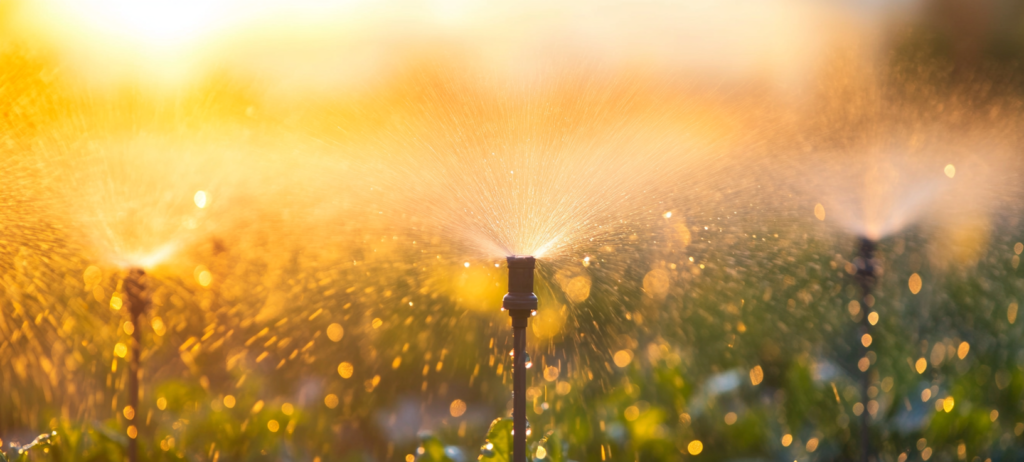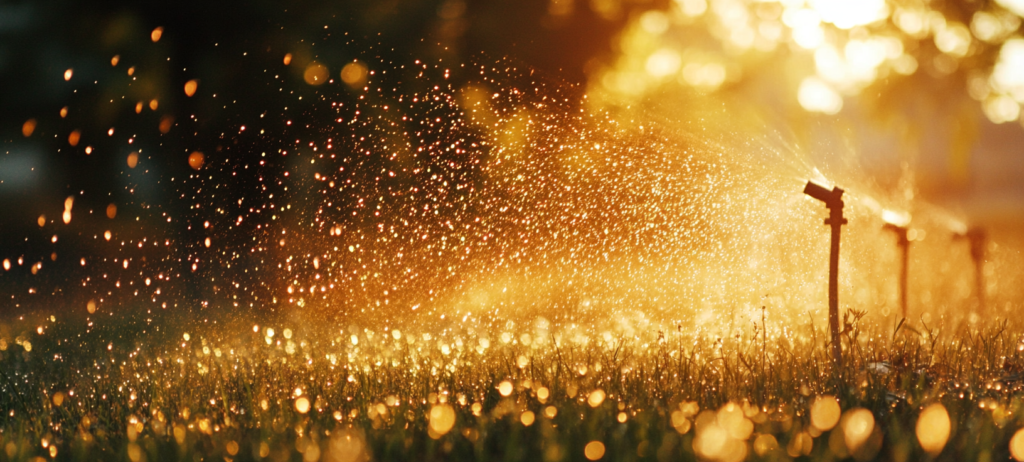The Pros and Cons of In-Ground Sprinkler Systems
One of the most effective ways to keep your lawn healthy and well-watered is through an in-ground sprinkler system. In this blog post, we’ll explore the pros and cons of in-ground sprinkler systems to help you make an informed decision about whether this type of irrigation system is right for your garden maintenance needs.
How Do In-Ground Sprinklers Work?
Before diving into the pros and cons, let’s briefly explain how in-ground sprinklers work. An in-ground sprinkler system consists of a network of underground pipes connected to pop-up sprinkler heads.
These heads rise above the ground when the system is activated, distributing water evenly across your lawn. The system is controlled by a timer and can include sensors that adjust watering schedules based on weather conditions.
The Pros of In-Ground Sprinkler Systems
1. Efficient Irrigation
One of the biggest advantages of in-ground sprinkler systems is their efficiency. These systems are designed to deliver water directly to the root zone of your plants, minimizing evaporation and runoff. This ensures that your lawn receives the right amount of water at the right time, promoting healthier growth.
2. Convenience
With an in-ground sprinkler system, you can set it and forget it. Modern systems come with programmable timers that allow you to schedule watering sessions, ensuring your lawn is consistently hydrated without manual intervention. This is particularly beneficial for busy homeowners or those who travel frequently.
3. Water Conservation
We can equip in-ground sprinkler systems with rain sensors and soil moisture sensors, which prevent the system from running during or after rainfall. This feature helps conserve water, making your irrigation practices more environmentally friendly and cost-effective.
4. Aesthetic Appeal
In-ground sprinkler systems are virtually invisible when not in use, as the sprinkler heads retract into the ground. This maintains the aesthetic appeal of your lawn and garden, unlike above-ground hoses and sprinklers that can be unsightly and cumbersome.
5. Increased Property Value
A well-maintained lawn with an efficient irrigation system can boost your property’s curb appeal and overall value. Potential buyers often view an in-ground sprinkler system as a desirable feature, which can make your home more attractive on the market.
The Cons of In-Ground Sprinkler Systems
1. Initial Installation Cost
The upfront cost of installing an in-ground sprinkler system is typically more than other options. It involves digging trenches, laying pipes, and setting up the control system, which requires professional installation. However, this initial investment can be offset by long-term water savings and increased property value.
2. Maintenance Requirements
Like any mechanical system, in-ground sprinklers require regular maintenance to ensure they function properly. This includes checking for leaks, cleaning sprinkler heads, and winterizing the system to prevent damage from freezing temperatures. Without proper maintenance, the system can become less efficient and more costly to repair. We’re happy to keep your in-ground sprinkler system working perfectly.
3. Potential for Damage
Since the pipes are buried underground, they can be susceptible to damage from landscaping activities, tree roots, or ground movement. Repairing damaged pipes can be challenging and may require professional assistance.
4. Water Pressure Issues
In-ground sprinkler systems rely on adequate water pressure to function effectively. If your home’s water pressure is low, the system may not operate as intended, leading to uneven watering. In some cases, a booster pump may be required to ensure optimal performance. We’ll ensure you have the correct water pressure when we install your system.
5. Complexity of System Design
Designing an effective in-ground sprinkler system requires careful planning to ensure even water distribution. Factors such as soil type, plant needs, and landscape layout must be considered. Improper design can result in over-watering or under-watering certain areas of your lawn, potentially harming your plants, which is why it’s so important to get professional installation.
Types of In-Ground Sprinkler Systems
There are several types of in-ground sprinkler systems, each with its own set of benefits:
Pop-Up Sprinklers
Pop-up sprinklers are the most common type and are ideal for lawns. They remain hidden underground when not in use and pop up to water the lawn when activated. They come in various spray patterns, including fixed, rotating, and oscillating.
Drip Irrigation
Drip irrigation systems deliver water directly to the root zone of plants through a network of tubes and emitters. This type of system is highly efficient and reduces water waste. It’s ideal for flower beds, vegetable gardens, and shrubs.
Rotary Sprinklers
Rotary sprinklers are designed for larger areas and deliver water in a rotating stream, which ensures even coverage. They are suitable for lawns, large gardens, and landscapes with varied plantings.
Impact Sprinklers
Impact sprinklers are durable and can cover large areas with a powerful jet of water. They are often used in agricultural settings but can also be effective for large residential lawns and gardens.
Should You Invest in an In-Ground Sprinkler System?
Deciding whether to invest in an in-ground sprinkler system depends on various factors, including your budget, lawn size, and watering needs. Here are some considerations to help you make the decision:
Benefits
- Efficiency: In-ground systems provide consistent and efficient watering, promoting healthier lawns and gardens.
- Convenience: Automated systems save time and effort, especially for busy homeowners.
- Water Conservation: Modern systems with sensors help conserve water and reduce utility bills.
- Aesthetics: In-ground systems maintain the visual appeal of your landscape.
- Property Value: An efficient irrigation system can increase your home’s market value.
Drawbacks
- Cost: Initial installation and maintenance costs can be high.
- Maintenance: Regular upkeep is required to ensure optimal performance.
- Complexity: System design and water pressure issues need to be addressed for effective operation.
For homeowners interested in maximizing garden health and efficiency, an in-ground sprinkler system is a worthwhile investment. To ensure the best results, consider hiring a professional for installation and maintenance. At American National Sprinkler & Lighting, we offer expert services to help you design, install, and maintain an efficient irrigation system tailored to your specific needs.
Conclusion
In-ground sprinkler systems offer numerous benefits, from efficient irrigation and water conservation to enhanced property value and convenience. However, they also come with potential drawbacks such as initial installation costs and maintenance requirements.
By carefully weighing the pros and cons, you can make an informed decision that aligns with your garden maintenance goals and budget.
If you’re ready to invest in an in-ground sprinkler system, contact American National Sprinkler & Lighting for a free consultation. Our experienced team will guide you through the process, ensuring you get the best system for your landscape. With our professional installation and maintenance services, you can enjoy a beautiful, healthy lawn with minimal effort.
Additional Resources
- How to Pick the Right Company for Your Home Irrigation System
- Maximizing Garden Health with Smart Irrigation Practices
By exploring these resources, you can further understand the benefits and intricacies of in-ground sprinkler systems and make the most informed choice for your home.



